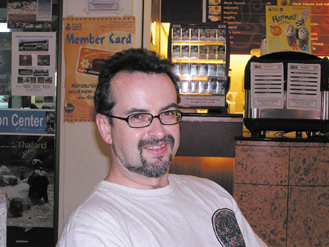
A full time lecturer
Practical English Education Communication Department
Over the past few years a number of foreign resident bloggers have angered Korean netizens for something other than the usual reasons the foreign community is attacked (forged degrees, dating Korean girls, smoking marijuana). The crime these foreign bloggers committed was simple criticism of Korean society. I want to pose this question “Do foreign residents have the right to criticize Korean society without fearing attacks from Korean netizens?”
The short answer is no, any foreign resident who blogs on Korean issues should expect to be on the receiving end of a considerable amount of vitriol from local netizens who take issue with any sort of foreign criticism. Koreans are famously thin skinned and hot tempered so this should be obvious. But I do think there are some steps that blogger-critics can take to avoid or deflect the attention of netizens who have no life and spend their time trolling the net looking for real or perceived insults to the Korean nation.
The first is to confine your analysis to issues that concern Korean-foreign interaction. Whether this is at an international, business or personal scale, foreign residents do have a legitimate stake in these discussions; FTAs, mad cow riots, English education, etc. Presenting your views on these issues in a clear, logical and well written manner is legitimate. If you are attacked by xenophobic Korean nationalists for your thoughts, well, so what? This sort of belligerent behavior is hardly unusual and not confined to Korea. One only has to look at how the conservative blogosphere, tabloid press, talk radio and Fox News in North America deal with dissenting voices to put this into perspective.
The second is simply to avoid topics where we have no stake in the discussion or internal issues that do not affect us. This does not mean that our opinions are invalid but simply to choose your battles wisely. Or, to put a different spin on an old saying, “Do we have a dog in this fight?” The most obvious example is Dokdo. This is a purely Korean issue with some Japanese input. This one-sided dispute in no way, shape or form affects foreign residents here. Pointing out the perceived flaws in logic or the inanity of the dispute will only serve to inflame local militants. Just accept it. Furthermore, mocking local customs is serious bad form for any guest, which is what we are. Watching the National Assembly brawls may well be humorous, or repellent or unbelievable but this does not affect us and if that is the way Korean politicians want to conduct the peoples business, well, roll your eyes and move on. But do not make them an object of ridicule.
Now, I am not suggesting that foreign residents censor themselves when it comes to Korean issues. This is a free, democratic state and while many in this culture retain authoritarian, insular and xenophobic tendencies I think that foreign residents who live in another country for an extended time have an inherent right to comment on what they see going on in their host society. Just be prepared for a visceral backlash from those who think foreigners should keep their mouths shut. After all, Koreans themselves certainly do not hold back when commenting on what they believe goes on in western countries, despite the fact that most have never and will never live in North America or Europe. So why should we?
Finally, I do have one piece of advice for Koreans in their interaction with the foreign community here and it is this; Do not ask the opinions of foreigner residents if you are not prepared for criticism. All too often we are asked “What do you think of Korea?” Most of us who have been here for some time recognize this as attempt to extract acompliment rather than an honest question. If Koreans really want to know what we think, be more specific in your questions and be ready for criticism, not necessarily praise. If you ask me what I think of Seoul, dog soup, mad cow protests or whatever, I will tell you exactly what I think. If you do not want to know, do not ask.
Materially, Korea is an advanced nation and Korean citizens, and in particular the netizens, will have to show some maturity and realize that this country and its ways are subject to criticism as it continues to advance and interact with the outside world.

